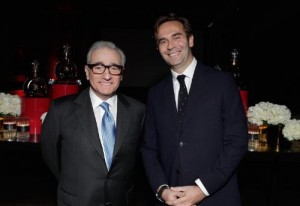By MCN Editor editor@moviecitynews.com
LOUIS XIII® Partners With The Film Foundation to Advance Film Preservation
The King of Cognacs Preserves “True Genius” in Cinema
 LOS ANGELES, Nov. 7, 2011—LOUIS XIII® Grande Champagne Cognac, the world’s most esteemed spirit from the House of Remy Martin®, announces a new partnership with The Film Foundation, the leading non-profit film preservation organization, founded by filmmaker Martin Scorsese. LOUIS XIII and The Film Foundation are both known for upholding living histories and have a shared purpose of artistry and heritage. The collaboration will include a contribution from LOUIS XIII to The Film Foundation in support of the foundation’s film preservation activities in 2012, as well as additional support and participation at exclusive Film Foundation events. The partnership will launch with a select and private gathering in Los Angeles on November 3, marking the first occasion in which a spirit House enters into an official partnership with The Film Foundation.
LOS ANGELES, Nov. 7, 2011—LOUIS XIII® Grande Champagne Cognac, the world’s most esteemed spirit from the House of Remy Martin®, announces a new partnership with The Film Foundation, the leading non-profit film preservation organization, founded by filmmaker Martin Scorsese. LOUIS XIII and The Film Foundation are both known for upholding living histories and have a shared purpose of artistry and heritage. The collaboration will include a contribution from LOUIS XIII to The Film Foundation in support of the foundation’s film preservation activities in 2012, as well as additional support and participation at exclusive Film Foundation events. The partnership will launch with a select and private gathering in Los Angeles on November 3, marking the first occasion in which a spirit House enters into an official partnership with The Film Foundation.
Celebrated across the globe as the King of Cognacs, LOUIS XIII understands the importance of archival techniques, stewardship of legacy and the true value of passionate dedication to a fragile medium. With this unique French savoir faire passed down from generation to generation, LOUIS XIII was officially registered in 1874. Today, every decanter remains the resulting effort of four generations of Cellar Masters. LOUIS XIII is a unique blend of 1,200 eaux-de-vie from Grande Champagne aged up to 100 years, yielding one century in each glass.
“Much like the time, finesse and care it takes to create a rare, luxurious spirit such as LOUIS XIII, so does film preservation. Film is at the heart of the American and French culture and both mediums require a high degree of talent and craftsmanship to maintain,” said Augustin Depardon, Global Marketing Director – LOUIS XIII. “LOUIS XIII has been enjoyed over centuries and we want to ensure the same for classic films, which is why we believe this partnership with The Film Foundation, and their dedication to preserving motion picture history, is so important for our House to honor and support.”
“We’re grateful to LOUIS XIII for their support of The Film Foundation and our work in film preservation,” said Jennifer Ahn, Managing Director of The Film Foundation. “LOUIS XIII is a brand that’s committed to preserving its rich history, just as The Film Foundation is committed to preserving the cinematic heritage that we all share. LOUIS XIII’s True Genius program is a great opportunity to highlight some of the important films we’re helping to restore, some of which were created a century ago and will still be there a century from now. Just like LOUIS XIII Cognac.”
For more information on LOUIS XIII de Remy Martin please visit www.louis-xiii.com.
About LOUIS XIII de Remy Martin
LOUIS XIII Cognac was created in 1874 by the House of Remy Martin founded in 1724. It is an intricate alchemy blended from 1,200 eaux-de-vie, created from the chalky soils of Grande Champagne, the best growing area of the Cognac region, France. This cognac ages up to 100 years in specially crafted barrels called tiercons. Four generations of cellar masters have worked to oversee the unique blend, which evokes tasting notes and scents of myrrh, honey, immortelle, plum, honeysuckle, wood bark, leather and passion fruits, making it the most complex and most prestigious cognac in the world.
The Film Foundation (film-foundation.org), a nonprofit established in 1990 by Martin Scorsese, is dedicated to protecting and preserving motion picture history and provides substantial annual support for preservation and restoration projects at major film archives. The foundation raises awareness of the urgent need to preserve films and has helped save over 555 films. Joining Scorsese on the board are Woody Allen, Paul Thomas Anderson, Wes Anderson, Francis Ford Coppola, Clint Eastwood, Curtis Hanson, Peter Jackson, Ang Lee, George Lucas, Alexander Payne, Robert Redford and Steven Spielberg. The Film Foundation is aligned with the Directors Guild of America whose President and Secretary-Treasurer serve on the foundation’s board.
# # #













